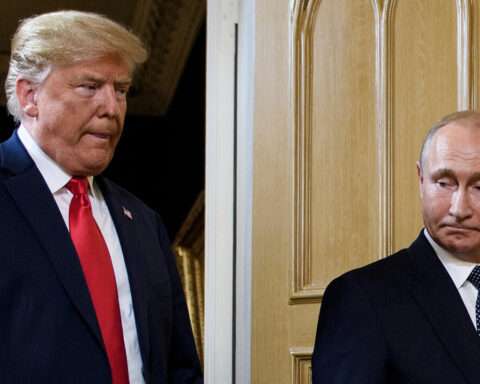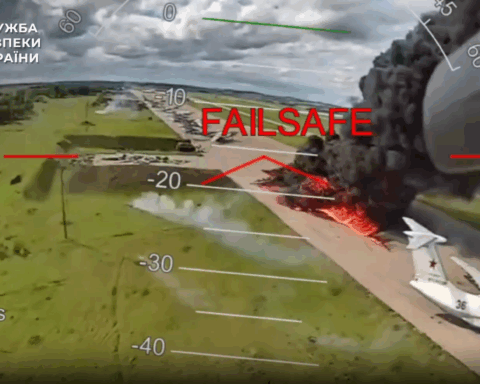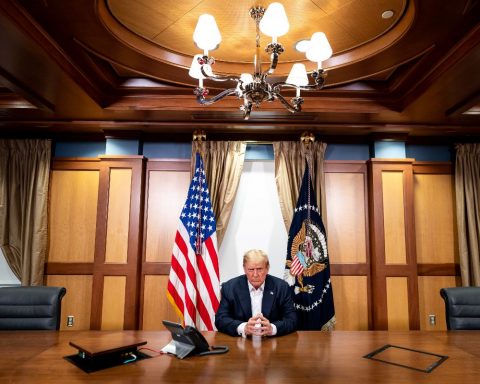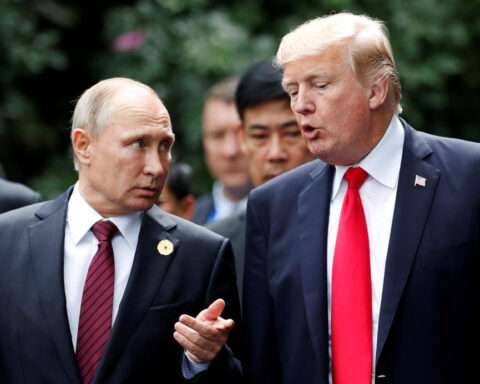Russia’s War On Ukraine – Before an assemblage of Russia’s ruling elites late last month, Russian President Vladimir Putin attempted to redefine Moscow’s flagging war against Ukraine by claiming to annex four more Ukrainian regions, adding that the status of those areas as Russian would never be negotiable and that Moscow would defend the newly grabbed territory by all necessary means – which many observers took as a threat to use nuclear weapons.
Ukrainian President Volodymyr Zelenskiy responded immediately by saying there could be no political talks with Russia until Putin was out and by pressing for Ukraine’s accelerated admission into NATO.
With the attempted land grab, Putin created a new narrative in which the war was no longer a Russian intervention inside Ukraine against Ukrainian troops but a defensive war on Russian territory against a hostile NATO.
The Kremlin’s attempt to annex the Ukrainian territories was another example of Putin’s government “creating an alternative reality,” says historian Nathaniel Knight, who teaches Russian and East European history at Seton Hall University in the U.S. state of New Jersey.
Either Putin wins and forces Ukraine and the West to accept the annexations or — and this seems most likely the way things are going now — he suffers a crushing defeat.”
— Nathaniel Knight, Seton Hall University
“But real life is destroying these fantasies,” Knight told RFE/RL’s Russian Service in a Russian-language interview.
Putin’s move and his veiled nuclear saber-rattling have ramped up the standoff between Russia and the West, with analysts such as David Kramer, a former State Department official who is now a fellow at the Washington-based McCain Institute, urging that Western leaders not “be paralyzed.”
“The only correct reaction to these threats is expanding military aid to Ukraine to help it win the war and be prepared for any turn of events,” he told RFE/RL. “Any weakening of support for Ukraine would be a mistake, and we are not seeing this.”
Far-Fetched Scenarios
Although Kyiv and the West rejected Moscow’s annexation gambit as an outrageous violation of international law unworthy of serious consideration, the move had an effect that could prove momentous, analysts say: It shut off most, if not all, possible compromise off-ramps from the conflict for both Putin and the West, leaving room only for more dramatic outcomes.
For Russia, “the only possible winning scenario that could boost Putin’s power and popularity would be a military blitzkrieg,” says Yury Yarym-Agayev, a human rights activist and head of the U.S.-based Center for the Study of Totalitarian Ideology. “If Russia managed in the course of a few days and without major losses to eliminate the Kyiv government, that would be a step toward strengthening Putin’s power and popularity inside Russia…. But I think a victory for Russia is practically impossible.”
[Putin could] withdraw his troops and strengthen control and terror inside [Russia], working to get rid of many people [he considers] dangerous at home.”
— Sergei Yerofeyev, Rutgers University
It is widely believed that Putin expected Russian forces would unseat the Ukrainian government within days of the invasion on February 24, but their advance toward Kyiv was repulsed, and many analysts believe there is little or no chance that a second attempt could succeed.
“Either Putin wins and forces Ukraine and the West to accept the annexations or — and this seems most likely the way things are going now — he suffers a crushing defeat,” Knight says. “He should have stepped back earlier.”
Putin’s annexation gambit also reduced maneuvering room for the West, making the idea of compromise with Moscow even less palatable than it had been. Voices of so-called “realists” who have been urging negotiations with Moscow, even at the expense of Ukraine’s sovereignty, have been largely silenced.
“Of course, there are those in the United States who see any possible outcome as better than a nuclear war,” Knight says. “But I think everyone understands this is a very dangerous precedent that would mean that any madman or dictator from North Korea, Pakistan, or anywhere with nuclear weapons can just say: ‘Do what I want or there will be nuclear war.’ This would be intolerable.”
Ukraine Regions That Russia Says It Has Annexed
For the West, he says, the only way to avoid such a precedent with certainty would be a total defeat of Russia, comparable to what Germany experienced after World War II, including “a complete change of leadership…[with] some sort of filtration or lustration that would remove all those who are involved with what is going on now.

“Maybe we are even talking about military occupation like what happened in Japan and Germany after World War II,” he says. “Could this happen in Russia? It doesn’t seem realistic to me.”
Yarym-Agayev describes a similar scenario, adding as well the issue of massive war reparations, “the return of other seized territories such as Georgia’s South Ossetia and Abkhazia and [Moldova’s] Transdniester region,” and denuclearization.
Trouble At Home
In addition to attempting a land grab in Ukraine, Putin recently launched a military mobilization drive that has proved highly unpopular and, Kramer says, has shown him how weak Russian support for the war may actually be.
If Russia managed…to eliminate the Kyiv government, that would be a step toward strengthening Putin’s power and popularity…. But I think a victory for Russia is practically impossible.”
— Yury Yarym-Agayev, Center for the Study of Totalitarian Ideology
“Yes, Putin has mobilized the country,” he says, pointing to the protests that have cropped up around the country and the enormous number of Russians who have fled the country to evade the call-up. “But it is not the mobilization that he had in mind.”
As the domestic situation, despite years of harsh repression of dissent, becomes increasingly tense, Putin may be forced to devote more of his attention to simply remaining in power — and could turn to even greater repressions as a result.
“In this case, mobilization might not be a practical solution to military problems but rather the transition to a new level of control over society,” says sociologist Sergei Yerofeyev, who teaches at Rutgers University, also in New Jersey.
“[Putin could] withdraw his troops [from Ukraine] and strengthen control and terror inside the country, working to get rid of many people [he considers] dangerous at home,” Yerofeyev says. “I have in mind not just the elite but ordinary people — mass repressions. I think these are realistic possibilities. Putin is not cornered.”
WATCH: As Russia bombed cities across Ukraine on October 10, fighting continued to rage along the front lines in the east of the country. Artillery battles erupted in the hotly contested Donetsk region near Bakhmut, a strategic city in the Donbas.
Knight says that decisive setbacks in the war against Ukraine could lead to a weakening of central power in Russia, potentially resulting in “chaos.”
“The collapse of Russian statehood is a terrifying possibility,” he says, noting that Putin has spent years trying to make himself seem like the sole guarantor of stability in the country and cutting off alternative development paths.
Yarym-Agayev, however, argues the situation in Russia is becoming increasingly “revolutionary,” but not necessarily violent. Many people, he says, predicted civil war and mass violence when the Soviet Union collapsed in 1991, but those predictions went largely unrealized.
“I foresee a revolutionary change,” he says, “not the replacement of Putin by [hard-line insider Yevgeny] Prigozhin or [Kremlin-installed Chechen strongman Ramzan] Kadyrov. No, they will all run away…. This will be a revolutionary change. But the word ‘revolutionary’ doesn’t mean violence or an armed uprising. It means changes in state structures and in the policies of the people who come to power.”






